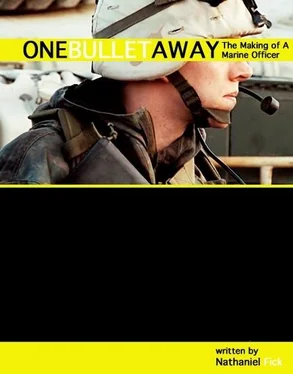Our only consolation was the flood of Army soldiers streaming north toward Baghdad. Their columns of tanks and trucks passed without pause through the days and nights. The Fourth Infantry Division had missed the war because Turkey had vetoed an American attack through its territory. But it arrived just in time for the occupation. We empathized with the soldiers on their way to a hot and dangerous summer of peacekeeping.
On our last night in the field, I was walking the battalion’s lines along the highway when an Army tanker truck pulled to a stop at the edge of the pavement. Five more swung in behind it. A second lieutenant hopped down from the cab and waved to me.
“Howdy. Can you tell me where to find the intersection with Highway 8?” he asked. He held a crumpled, hand-drawn map.
“Christ, man, you’re still like fifty klicks south of it.”
He looked perplexed. “Well, how’s the road up there? Safe?”
“Depends. You got an escort? Heavy weapons?”
The lieutenant gave a quick nod, dismissing my question. “We’re armed.” It was the verbal equivalent of snapping his suspenders.
“You mean that thing?” I pointed at the pistol on his belt.
“A rifle in every truck.” Defiant.
“Stay the fuck away from me. You guys have no maps, no weapons, no fucking clue where you are. I don’t want to be around when you get hosed.” I hated feeling that way and tried to make a joke of it, but I couldn’t. Sometime in the past month, we had become veterans. And like the veterans in every war, we didn’t want to be near the new guys. New guys got themselves killed.
On April 22, we drove another hundred kilometers south to what the division euphemistically called Tactical Assembly Area Paige, a former Iraqi military base on the outskirts of Ad Diwaniyah. RCT-5 had shot its way through the town a month before, and the bullet holes and shrapnel scars remained. The Marines said that Paige was biblical, not because it was down the road from Abraham’s Ur, but because each day brought a new plague — heat, wind, sand, flies, mosquitoes, and sickness. Our first morning there, after waking up in a septic field surrounded by burning trash fires, Gunny Wynn stared at the Iraqis digging for water in the noxious dirt. “These motherfuckers are tough,” he said. “Third world tough.”
The platoon lived in a carport a hundred feet long and twenty feet wide. Concrete pillars supported a concrete roof above the concrete floor. There were no walls. The concrete absorbed so much heat during the day that it was too hot to sleep near at night. It radiated like an oven until dawn, when it began recharging for the next night. I wanted to sleep under the sky, but disease-ridden sand fleas infested every patch of ground, so I settled for wrapping up in a waterproof sleeping bag liner and sweating through the night. Sleep was intermittent anyway. Living in a field of human waste spread dysentery through the platoon. The closest I came to willing my own death in Iraq was while curled up in the dust outside a plywood latrine, too weak to swat the jellybean-size flies clustered on my head.
Rumors swirled of surveillance missions along the Saudi border or patrols into Ad Diwaniyah. Eighteen thousand Marines slowly assembled at Paige, enough for almost any mission imaginable. The Marines kept active — studying maps, prowling for intelligence around the division’s headquarters, and working out with an improvised weight set of discarded Iraqi tank parts. But after three weeks, we received the order to turn over all our ammunition to other units driving north. On the division’s status board, a little green card next to First Recon’s name was changed to red. We were done.
Combat missions had galvanized the battalion. Without them, the pettiness of peacetime military life returned. One morning, the captain assembled our company for PT: a run around Paige followed by calisthenics. We stood in rows in the dust, wearing green shorts and tan combat boots, resigned to working out without a shower. The Marines were sullen; they resented taking orders from a leader they no longer respected.
The captain chose pushups as our first exercise. While he counted the repetitions, the whole company was supposed to echo him loudly. Instead, fifty Marines grunted silently through a set of twenty-five, mumbling numbers at the dirt. Crunches were next. The captain asked for a volunteer to lead the counting, and Gunny Wynn trotted to the front of the formation. He dropped on his back and began counting out loud. The company roared in unison, “One… two… three… four!” The Marines around us stopped to watch as they realized that a small mutiny was taking place. I smiled, staring at the sky as I curled my crossed arms to my thighs and tried to out-shout them all.
The captain summoned me that afternoon to his makeshift office in an old barracks building. I found him sitting behind a desk, wearing his full uniform instead of the trousers and T-shirt we usually wore in the heat. When he didn’t invite me to sit on one of the MRE boxes strewn across the floor, I knew I was in trouble.
“Lieutenant Fick, I’m relieving Gunny Wynn for insubordination.”
I started to reply, but he cut me off. “In Ar Rifa, he challenged my orders in front of the Marines,” he said. I tried again to speak, but he looked down at his paperwork and said, “Dismissed.”
My gut impulse was to throw my metal lieutenant’s bars on the captain’s desk and tell him I quit. But of course I couldn’t do that. Wynn and I were a team. We felt we had a duty to protect the platoon from the caprice of the larger corps. The Marines’ loyalty to Wynn was fierce, something like love. Relieving him would be a blow to their morale and to their trust in the battalion. I decided we had to put our pride aside and figure out a way to keep our jobs.
When I got back to the carport, Wynn was supervising the cleaning of the platoon’s sniper rifles. He looked up when I walked over.
“Let’s take a walk, Gunny.”
We left the camp and started down the road that ran for a mile along Paige. I felt light without my body armor, carrying a pistol instead of my rifle. Around us, Marines scrubbed weapons, counted ammunition into piles, and repaired their vehicles for the long drive back to Kuwait.
“The CO plans to relieve you for disobeying his orders,” I said.
Wynn took the news quietly and kept walking. Finally, he replied, “Bullshit. I only disobeyed his orders when they would have gotten people killed for no reason. I’ll go to the colonel.”
“No.” The word sounded harsher than I’d intended. “You need to let me deal with this.”
“Sir,” he protested, “these guys are attacking me when they’re the ones who screwed up. I’m going to the colonel.”
“Mike, this isn’t about you,” I said, trying to appeal to his sense of duty. “It’s about the platoon. You’re the only thing between these guys and our Marines. Listen to me: I will deal with it. I know it’s crazy, but I have more firepower right now.”
When we returned to the carport, I sat down to figure out what to say to the captain. He was a bad combat leader but not a bad person. It didn’t seem right to hold poor decisions under fire against him. To a greater or lesser extent, we had all made such mistakes. But vindictive decisions after the fighting was over were another matter. I thought the captain had a grudge against Wynn.
When I went back to the captain’s office, he looked up wearily.
“Sir, I feel obligated to warn you that you’ll have most of your company in revolt if you relieve Gunny Wynn,” I said.
This time he asked me to take a seat. To his credit, he listened while I explained that relieving Wynn over my objections meant that he no longer had faith in my judgment. If that was the case, then he should relieve me, too. When I hesitated, he waved a hand for me to continue. “Sir, we’re almost on our way home,” I said. “The company did its job and nobody died. Can’t we just let it go and get back to our lives?”
Читать дальше












